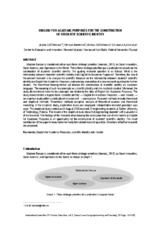English for academic purposes for the construction of students’ scientific identity
Autor
Zaščerinska, Jeļena
Andreeva, Natalia
Zaščerinskis, Mihails
Aļeksejeva, Ludmila
Editor
Universidad de Córdoba, UCOPressFecha
2016Materia
English for Academic PurposesScientific identity
Role models
METS:
Mostrar el registro METSPREMIS:
Mostrar el registro PREMISMetadatos
Mostrar el registro completo del ítemResumen
Modern Europe is considered within such three strategic priorities (Moedas, 2015) as Open Innovation,
Open Science, and Openness to the World. These three strategic priorities put a particular emphasis on the
construction of students’ scientific identity. The guiding research question is as follows: What is the
relationship between students’ scientific identity and English for Academic Purposes? Therefore, the aim of
the present research is to analyse the scientific literature on the relationship between students’ scientific
identity and English for Academic Purposes underpinning elaboration of a new research question for further
studies. The theoretical framing herein will discuss the construction of scientific identity via academic
language. The meaning of such key concepts as scientific identity and role models is studied. Moreover, the
study demonstrates how the key concepts are related to the idea of English for Academic Purposes. The
study demonstrates a logical chain: scientific identity → English for Academic Purposes → role models →
an empirical study within a multicultural environment → conclusions. Research methods include theoretical
and empirical methods. Theoretical methods comprise analysis of theoretical sources and theoretical
modelling. In the empirical study, explorative study was employed. Interpretative research paradigm was
used. The empirical study carried out in August 2015 involved 22 engineering students at Tallinn University
of Technology, Estonia. The results of the empirical study show that engineering students’ self-evaluation is
of the low level. The findings of the research allow drawing the conclusion that use of role models in English
for Academic Purposes is an opportunity for the construction of students’ scientific identity. The novel
contribution of the paper is revealed in the newly formulated research question. Directions of further research
are proposed.

